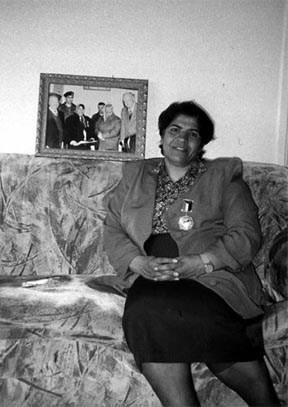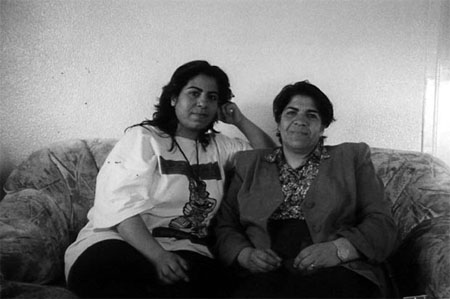
|
 |
|
Ferial Abu Heikal (wearing her award with the photo of the award-giving ceremony in the background). |
| Ferial Rasheed Khamis Abu Heykal, Tel al-Rimad, Hebron, June 13:
|
|
Mostly in choosing speakers I avoided anyone well-known. But after listening to Ferial Abu-Heykal's speech accepting an award for courage during a conference in Jerusalem, I decided to try to record with her, especially because she lives in Hebron, a district continually threatened by armed Jewish settlers. It was good that I went. The difficulty of reaching the isolated Abu Heykal home on top of a hill overlooking Hebron city was a concrete lesson in threat.
I had to go first to the Jewish Cemetery, an enormous marble structure at the bottom of Tel al-Rimad. From there I walked up past two Israeli Army checkpoints, along deserted roads and paths. For me the disturbing thing was not knowing who was Arab and who was an Israeli settler. Some of the houses I passed were clearly occupied by settlers. Seeing a mosque at the top of the hill gave me a sense of security; a man on a nearby balcony pointed out the Abu Heykal home beyond some olive orchards. It's a relatively substantial 2-storey home with yard space and fruit trees around it. Nice and normal enough until you see, poking up behind a hedge, a TV monitor like the ones in large stores. Ferial tells me this was installed by the IDF the day after the announcement of the Oslo Accords. There's an IDF post only 20 or 30 meters away, placed on their land the day after the mosque massacre, which Ferial insists was planned. Their nearest neighbour is Baruch Marzel, brother of the leader of Kach, a militant settler movement responsible for many attacks against Palestinians, notably the massacre in Hebron mosque in 1994. Other anecdotes highlight the state of siege in which the Abu Heykal family live. Once Ferial came home to find that Jewish settlers had managed to place a ladder against the wall of their house, and were about to occupy the roof (a favoured method of making life insupportable Palestinian house-owners). Ferial's children have to go and return every day from school on the paths I came by, always in danger of attack by settlers or their children. I'm not surprised that they are taking karate training. The girls' school which Ferial heads is in the Old City. Settler attack is continuous. There have been times when settlers have brought dogs to set on schoolgirls as young as six years old. |
Other times they throw refuse into the school-yard. Many of the struggles have revolved around the flag displayed over the school, with Israelis attempting to substitute the Israeli flag, and the Palestinians -- staff and students -- resisting.
Ferial explains the reasons why Israelis want to expel Palestinians from Tel al-Rimad. The word 'rimad' is Arabic for ashes. The purple-brown colour of the earth here is the sign of ancient civilization, ground-down pottery fragments that are probably the remnants of ancient Canaanite settlements, or even earlier. Settlers started coming to Hebron soon after the 1967 war. In 1984, they started settling on Tel al-Rimad in caravans, claiming that an ancient Jewish cemetery, possibly King David's tomb, lies under the mound. The land on which the Abu Heykal house is built is family land. They built it in 1982, moved in before it was finished because they were sure the settlers would grab it if they didn't.
Ferial Abu Heykal speaks: At the beginning of the '60s an order came from King Hussein to destroy the houses around the Ibrahimi sanctuary on the eastern side. There was an old fortress near it, there was a tower that Nasser Salah al-Din Ayoubi had built, and another castle near the sanctuary that was known to be very old. He destroyed them all - an area of many dunums. Many houses were destroyed. Many Palestinian families lived around the sanctuary. All of them were forced to leave, before the war of 1967, at the beginning of the '60s. He destroyed ancient ruins, among them a place called the Irbat, it was destroyed as well..."[Among the houses destroyed near the Sanctuary was that of Ferial's family.] |
 |
| Ferial Abu Heikal with one of her daughters. Tell al-Rimad - Hebron June 1998. |
[Ra'ida Shehadeh] [Bedouin women at 'Jahilin camp'] Copyright©2005 |
|